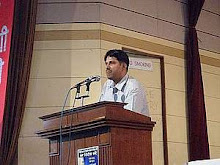Dear Friends,
Executive Summary of the ICRIER Report
The much awaited ICRIER Research, ordered by PMO at the behest of Sonia Gandhi letter, on the impact of Corporate Retail on small shopkeepers and vendors, is reported to finally being submitted to Ministry of Commerce on 26th May, 2008. According to the executive summary of the report, which is already in possession of India FDI Watch, the real GDP is expected to grow at 8-10 per cent per annum in the next five years. As a result, the consuming class with annual household incomes above Rs. 90,000 is expected to rise from about 370 million in 2006-07 to 620 million in 2011-12. Consequently, the retail business in India is estimated to grow at 13 per cent annually from US$322 billion in 2006-07 to US$590 billion in 2011-12. In other words, the report believes that there are 37 crore middle class people in India and the number will rise to 62 crore in next 3-4 years and is banking on further raising their wasteful consumerist quest to fuel the retail business. However, the great Indian middle class on which they are banking is really missing. The data is misleading and far from the truth.
The data collected by National Sample Survey Organization (NSSO) in 2004-05 and the 2007 report of the National Commission for Enterprises in the Unorganised Sector (Arjun Sengupta Commission) is definitely believed to be among most comprehensive surveys on employment-unemployment and consumption expenditure. The NSSO surveys collect data on consumption from each of the selected sample households in a detailed schedule containing a list of every conceivable item of consumption ranging from edibles to fuels to clothing and consumer durables, and also include educational and medical goods and services. Based on these extensive datasets, the NCEUS computed the monthly per capita consumption expenditure (MPCE) and daily per capita consumption expenditure (DPCE) in an effort to evaluate the performance of the economy in terms of the consumption expenditure. The result is alarming.
Almost 77 per cent Indians [the extremely poor (6.4%), the poor (15.4%), the marginal (19%) and vulnerable (36%)] on an average subsist on less than Rs 20 per day. Forget about the middle class, even the high income group just constitute 4% of the population. And even this group has an average daily consumption of Rs 93 only. So, where are the 370 million people to whom Corporations are eying for?
Any way, coming back to the ICRIER report, the corporate retail is projected to grow at the rate of 45-50 per cent per annum, whereas the retail business overall is estimated to grow only at 13 per cent annually. It is crystal clear that the alarming rise of the corporate retail will be only at the cost of millions of people employed in the present retail sector. The ICRIER research is also short sighted and does not take into account the long term impact on farmers, manufacturers, consumers. It also did not study the socio, cultural and environmental impact of corporate retail.
The research findings are based on a survey of 2020 unorganized small retailers across 10 major cities; 1318 consumers shopping at both organized and unorganized retail outlets; 100 intermediaries; and only 197 farmers. A control sample survey was also done of 805 unorganized retailers who are not in the vicinity of unorganized retail outlets in four metro cities. Detailed interviews were also carried out for 12 large manufacturers, 20 small manufacturers and six established corporate retailers.
Main Findings
- Unorganized retailers in the vicinity of organized retailers experienced a decline in their volume of business and profit in the initial years after the entry of large organized retailers
- the adverse impact on sales and profit weakens over time
- there is some decline in employment in the north and west regions which, however, also weakens over time
- the rate of closure of unorganized retail shops in gross terms is found to be 4.2 per cent per annum
- the rate of closure on account of competition from organized retail is at 1.7 per cent per annum
- small retailers have been extending more credit to attract and retain customers
- most unorganized retailers are committed to remaining independent and barely 10 per cent preferred to become franchisees of organized retailers
Policy Recommendations
- Modernization of wetmarkets through public-private partnerships
- Facilitate cash-and-carry outlets
- Encourage co-operatives and associations of unorganized retailers for direct procurement from suppliers and farmers
- Facilitate the formation of farmers cooperatives to directly sell to organized retailers
- Encourage formulation of private codes of conduct by organized retail for dealing with small suppliers, these may be then be incorporated into enforceable legislation
- Strengthening the Competition Commission role for enforcing rules against collusion and predatory pricing
- Modernization of APMC markets as modeled on the National Dairy Development Board (NDDB) Safal markets in Bangalore
In Solidarity!
Dharmendra Kumar
Director
India FDI Watch
M-9871179084
Email:
dkfordignity@yahoo.co.ukdkfordignity@gmail.com
Subscribe to:
Post Comments (Atom)

No comments:
Post a Comment